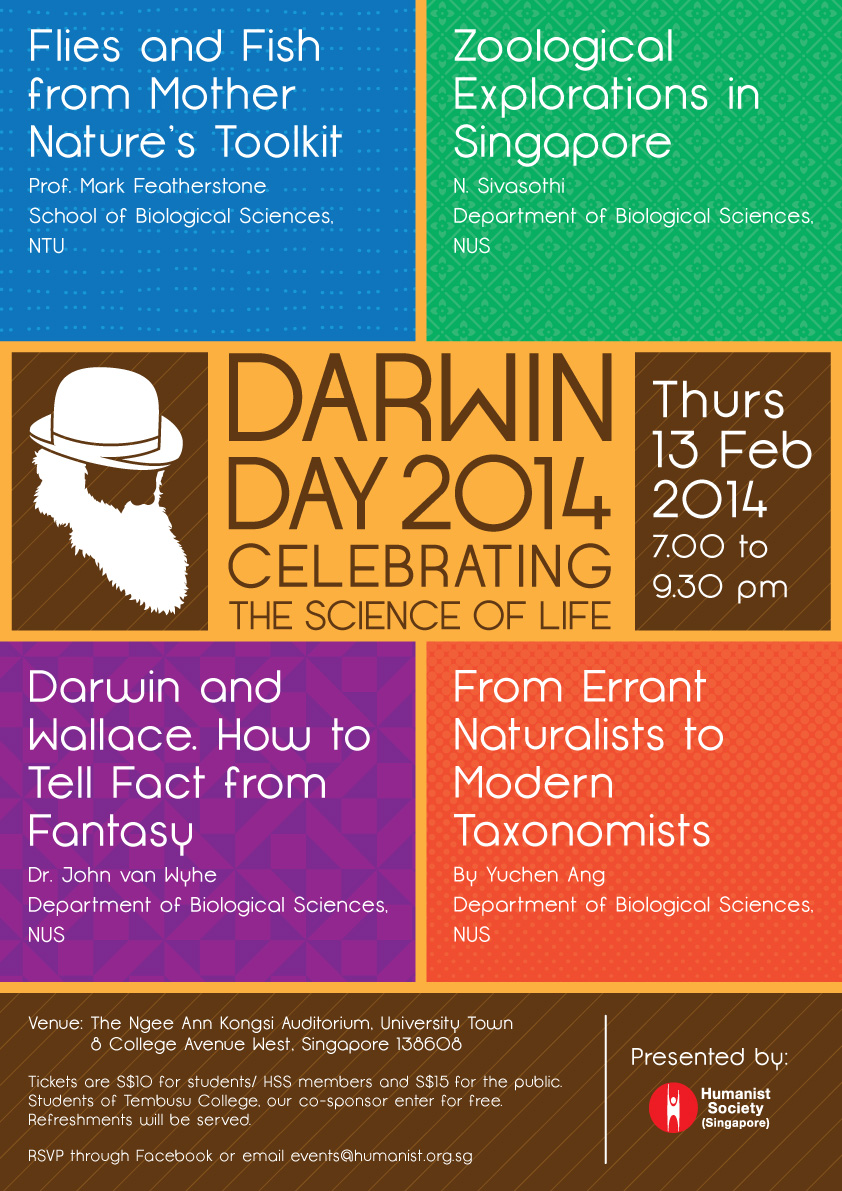Date
13/02/2014
Time
7:00 pm - 9:30 pm
Location
The Ngee Ann Kongsi Auditorium
University Town – 8 College Avenue West
Singapore
Join us as we celebrate the amazing biodiversity of our planet at Darwin Day 2014 – this time in the beautiful campus location of U-Town, National University of Singapore.
- Date: Thursday 13 February 2014
- Place: The Ngee Ann Kongsi Auditorium, University Town – 8 College Avenue West, (S)138608
- Time: 7pm – 9.30pm (refreshments will be served.
Tickets are S$10 for students/ HSS members and S$15 for the public. Students of Tembusu College, our co-sponsor, enter for free.
Please RSVP early to secure your place for this event, either through Facebook or Email.
For group RSVPs, drop a message to events@humanist.org.sg with your name and group size.
Proudly brought to you by the Humanist Society (Singapore). Members are invited to renew their membership, which expires end 2013.
Find out about the Humanist Society Singapore: https://humanist.org.sg/
Find out about our event venue: http://bit.ly/1aE8ohr
Facebook event page: https://www.facebook.com/events/223031411215174/
—————————————-
DARWIN DAY TALKS:
Talk #1: Flies and Fish from Mother Nature’s Toolkit
By Prof. Mark Featherstone, NTU
Learn about the underlying unity of molecular mechanisms producing biological form and how this has been “exploited” in evolution to generate diversity.
Speaker:
Mark Featherstone was a Professor at McGill University in Montreal for 17 years before joining the School of Biological Sciences at Nanyang Technological University in 2006. His research focuses on the control of gene expression during embryonic development and during infection by the malaria parasite Plasmodium falciparum.
Talk #2: Zoological Explorations in Singapore
By N. Sivasothi, NUS
Protected and unprotected secondary forests still constitute 14% of Singapore. Nestled there and in her unprotected marine environment are a variety of large and charismatic fauna such as pangolins, otters, dolphins, dugongs, wild boar, turtles, monitor lizards, mouse deer and common palm civets.
Zoological explorations in Singapore by staff and student researchers, along with an active natural history community, continue to raise the awareness of a very surprised urban citizenry and address conservation challenges though a variety of avenues. This talk will highlight some of these discoveries and projects.
Speaker:
N. Sivasothi, a.k.a. ‘Otterman’ has been immersed in mangroves for research, education and conservation at the National University of Singapore since the late 80’s. Presently focused on undergraduate teaching and research, he and his students undertake zoological explorations with endangered freshwater crabs, mangrove crabs and mudskippers, common-palm civets, mouse deer, wild boar, the red jungle fowl and of course, otters.
Talk #3: Darwin and Wallace. How to tell fact from fantasy.
By Dr. John van Wyhe, NUS
2013 was the centenary of the co-proposer of the theory of evolution by natural selection, Alfred Russel Wallace. Happily there were many Wallace events and publications around the world which have helped to raise his profile. Unfortunately, most of these depicted Wallace and Darwin not according to what professional historians have uncovered, but on the ever more extreme stories told by amatuers and enthusiasts who see Wallace as a hero. So what really happened?
Speaker:
Dr John van Wyhe, leading expert in the life and work of Charles Darwin, will be presenting a brief overview of Darwin’s life and main achievements, including his round-the-world journey on the survey ship, HMS Beagle. Dr John will be speaking about Darwin’s discoveries during this voyage, highlighting the many unique specimens of plants and animals found on the Galapagos Islands.
John van Wyhe (B.A., M.A., Ph.D. (Cantab)) is a historian of science, Senior Lecturer in the Departments of Biological Sciences & History and a Fellow of Tembusu College at the National University of Singapore. He is the founder and Director of Darwin Online and Wallace Online, Professorial Fellow of Charles Darwin University, Fellow of the Linnean Society of London and a Scientific Associate of the Natural History Museum (London).
Talk #4: From errant naturalists to modern taxonomists – how the study of life has evolved since the 19th Century
By Yuchen Ang, NUS
Since antiquity, Man has sought to understand and catalogue the natural world. This ‘need for order’ was formalized into the science of taxonomy by Linneaeus in the 1700s. Since then, naturalists have been exploring and describing their way to every accessible corner of the Earth – including Darwin and Wallace, who also launched the evolutionary theory and matured taxonomy into a modern-day discipline. Today, taxonomists continue to trudge in the well-worn shoes of field-collecting, species descriptions and systematics. Let us then explore the life of a modern-day naturalist: the hopes and worries, the challenges, the technological advancements since the 19th Century, and most importantly, the passion that inspires every taxonomist to say, “…this is why I do what I do”
Speaker:
Yuchen is a dipterist (a person who studies flies) who just recently finished his Ph.D. in Evolutionary Biology at the National University of Singapore. While his research interest is primarily in investigating sexual selection and its influence on morphological evolution, he is an old-school naturalist at heart, happiest when he’s out collecting flies in the jungles of Vietnam, the Karoos of South Africa, or bent over a microscope looking at his specimens, thinking “oh boy – I think this is a new species…”





